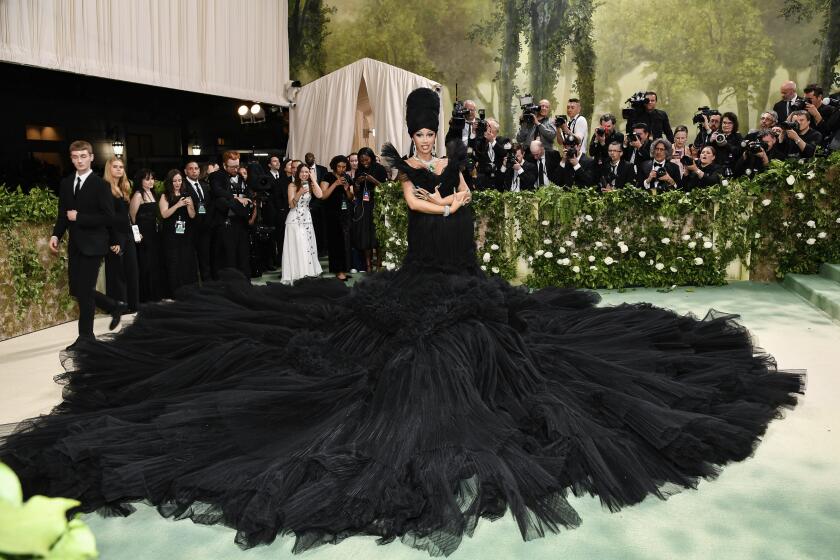Creating Natural Scent’s Allure Is a Fading Art, Perfumer Says : Tradition: A master of making fragrances finds he can’t compete with mass-produced sweet smells.
Like his father and his grandfather, Mohammed Abdel-Sayed Khattab is the keeper of sweet secrets. Roses, violets, ambergris, jasmine, lilacs, oils. A drop here, a drop there.
The makings of great perfume. But today his sweet smells, products of the ages, can’t compete with their mass-produced cousins.
And inside a wooden storefront that tunnels from the modern world into the medieval, Khattab struggles to delay the end.
“Egypt invented perfumes,” he says. “Now in Egypt they will end.”
The lone survivor of ancient tradition, Khattab has no heirs, no apprentices. His secrets are sought by American publishers and French perfumers, he says.
He has written a 250-page book on his art--”The Devil Runs From the Perfume”--that remains by his side, unpublished despite offers from abroad.
As for the Parisian upstarts, he says, “The great French perfume houses have tried to lure me for years, but they just want my secrets. I am as much a part of my perfumes as they are of me.”
New research in the United States has found that people can discern 10,000 smells, animals more. Khattab, 70, doesn’t need science to tell him much of anything about smelling.
“You take five women, and if they’re left alone, they’ll leave with five different perfumes,” he says. “Each smells in her own way.”
Each year Khattab introduces a new scent or two, each developed through years of blending. He remembers little except a life around perfumes, a trade he began learning at age 4 by watching and waiting.
“It was a good time, then, the great families of Arabia coming for the perfumes. But all that changed in the last 50 years,” he says, shaking his head.
“Then there were only four or five types. Of course my family could have made hundreds, as I do today, but women knew what they wanted and bought that.
“Women didn’t buy because a perfume was fashionable, or because it was advertised well. A woman would take a sniff, and she knew. And she’d keep that same scent for 30 years or more, sometimes forever.”
He credits the long-lasting allure of Egyptian perfumes to their lack of artificiality. He finds it remarkable that the same quality is sought after today in other parts of the world for other products.
“People are going crazy over all-natural,” he says. “Our perfumes always have been.”
Perfumes have wafted over the Nile since the Pharaohs and their queens used them to lessen the dreary harshness of their desert world. They perfumed gardens with flowers and blossoming trees, themselves with a variety of concoctions. Women placed scented animal fat beneath their wigs, its perfume covering their bodies and clothing as it melted.
Ancient Egyptians offered their gods sweet ointments. One of the first relics English archeologist Howard Carter saw as he entered Tutankhamen’s tomb in 1922 was a superb calcite perfume vessel and stand.
In Tut’s day, perfumes were made in two ways.
One was by placing flowers or other ingredients in a cloth container tied to two poles. Workers twisted the ends in opposite directions until the pressure produced the needed oils.
Other perfume makers heated oil or animal fats and dipped in flowers, seeds and fruits until the desired scent emerged.
Ancient perfumers extracted natural scents from lettuce, radishes, flowers, and later on from bitter almonds, anise seeds, ginger root, cinnamon bark, cedar and sandalwood, frankincense and myrrh.
The trick was to know to say “stop” when you achieved the precise smell. It still is.
Fine perfumes can contain 100 ingredients, each with a unique odor. “An Egyptian rose is one thing, but, ah, the Bulgarian. That’s a rose,” Khattab says.
Visitors entering Khattab’s shop smell nothing except, occasionally, burning incense. They are surrounded by hundreds of glass decanters. Perfumes are secreted behind faded curtains or hidden in narrow drawers.
Perfumes named Tutankhamen, Nefertiti, Cleopatra, Aida, Harem, Scent of Araby, Christmas Night, Arabian Night, Scheherazade and Secret of the Desert. Scents for women, scents for men. Incense to perfume the home. Kohl to beautify the eyes.
Scents in vials, bottles. Waxy ambergris, secreted by sperm whales and essential to perfume making, is packed tightly in a tub.
Egyptian perfumes owe their success first to the appreciation of the ancient Greeks and Romans. Then the Crusaders came, and they couldn’t get enough of the exotic fragrances captured in the Egyptian essences: spices brought from India in great sailing ships, woods and tree bark from Africa in great caravans.
Perfumes and ointments were consumed as medicines and as potions to ward off the powers of evil.
Ointments to open clogged blood vessels were blended from bitter almonds, unripe olives scented with cardamom, sweet rush, honey, wine, myrrh, balsa seed, turpentine resin. An ointment from lilies was said to treat female problems.
Powdered ostrich egg and wheat germ composed the ancients’ wrinkle cream. For dandruff, a concoction of hippopotamus fat, fish oil and mushy grease did the trick.
Egyptian perfumes thrived under Arab Muslim rule. “The Prophet Mohammed said he loved three things in life above all others,” Khattab says. “Prayer, women and perfume.”
Most modern perfumes are alcoholic solutions. But the oil-based Egyptian variety contains no alcohol, which is forbidden by Islam’s holy book, the Koran. Muslims used to purify themselves with perfumed water before entering a mosque.
In the right hands, perfumes could counteract the evil eye. “From the beginning perfumes had little to do with smelling good,” Khattab says.
Houses were equipped with caldrons filled with perfumed smells. “The devil runs from the perfume,” Khattab says. He made it the title of his book.
“The Arabian Nights” refers repeatedly to perfume-filled candles and oil lamps, incense and unguents.
Ladies of the house used ambergris and perfumes as mouthwash. Ladies of the night put scented ointment in their navels. Men used a little incense or perfumed wood to scent their beards.
Some of the traditions still lived when Khattab was young. But in the last half-century Arab women have turned from the love of oil-based perfumes to airier ready-made scents.
“It’s almost over, except for foreign visitors who want to understand the real thing,” Khattab says.
“People are busy. They never stop to think that store-bought perfume is only water, alcohol and artificial scents.”



